It’s not often that you begin a project accidentally and end up as a professional celebrating a quarter of a century dominating an industry (not quite single-handedly).
Yet that is precisely what Howard Duggan, owner of scenestr, has arguably achieved.
He recounts (over some hours) his perspective of 25 years: wins, losses, financial and emotional challenges and the moments he will never forget.
His years in the business have lent him an interesting perspective on the ever-changing nature of street press – although his is a digital-first company these days – and have shown him all-but unfazed by industry instability, advancing technology and pretty much anything, it seems.
Most would agree that a quarter of a century for any endeavour is impressive and worth celebrating. Even more so when you realise it’s been achieved in the so-called dying print media era where most publications are moving to an online-only format or ceasing entirely.
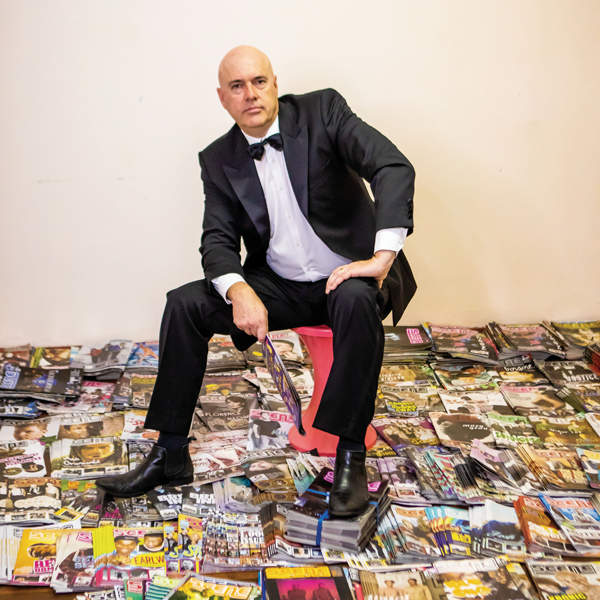 Howard Duggan: 25 years, 1,000+ issues
Howard Duggan: 25 years, 1,000+ issues
He is a man of many labels: industry stalwart, publishing professional, chess enthusiast, accidental innovator, devout family man, and cringeworthy joke-teller.
The man himself is supremely confident yet a contradiction in so many ways: a painful grammar purist yet the name of his magazine isn’t even a real word, incredibly kind yet outwardly brusque. On the 25-year milestone, the contradiction is his recalcitrance to trumpet the success and longevity of scenestr while reluctant to sweep it under the rug as if it’s no big deal.
This has left him wavering between organising a milestone event, replete with bands and drinks and speeches and photos. Or simply internalising the moment and preparing to meet – or create as the case may be – the next challenge.
When the focus has been on solid, unrelenting hard work for so long, perhaps it can feel strange to stop and smell the roses (or ink) as print deadlines don’t wait for any man – regardless of milestone achievements.
This has been the case for the life of scenestr (and its previous namesake Scene Magazine) and thus Howard had to become adept at juggling a family life and a punishing schedule, to grow the business and, at times, to stay commercially alive. Along the way, he has had to forfeit time with family and friends, special events and more – because in the end he alone holds the reins and responsibility of the magazine – and now fast-growing online business.
Ironically, notwithstanding sacrifices, drive, willpower and nous the magazine wasn’t even his idea.
The Beginning
“Scene Mag happened by accident and it wasn’t even my idea. In 1993 my brother Rohan, who was a graphic artist at a time the personal desktop/ Mac computing era was exploding, came to me with an idea. I was in business for myself (retail) but had previous experience selling advertising for News Limited with The Daily Telegraph and later The Sunday Mail. He said to me ‘Howard I’m going to start a magazine - would you come and help me sell it?’ And I said sure.“Soon after launch he moved on. He wasn’t enamoured that few were buying advertising (the revenue model for the magazine) and those who did, weren't always great paying their bills. He returned to a creative space and 25 years later I’m still here.”
From an honest beginning as a single, ambitious idea, the reality of the industry set in quickly and it became imperative to scope out the lay of the publishing land and lay claim to some part of it.
“Only once we started did we know there were already established mastheads such as Time Off and Rave (in Queensland). We had to learn what our space was. And our space was going to be what they weren’t. So we were clubbing, we were fashion, we were colourful, gloss and gay (and gay meaning queer). Within a few weeks of starting, we had a gay column. De rigueur in years to come, perhaps, but certainly not in the mid-nineties. Basically we were everything except balls-out rock (although that came soon enough) and off we went.”
As often happens with the retelling of a time in history, everything sounds incredibly cool, and if this story were told in colour this part would be in hyper-saturated rainbow tones. Energy was high, ideas were infectious, the adrenaline was pumping and the music was loud.
“My version of events is that by 2002 we’d become number one in market (Queensland). We certainly had more pages and advertisers – aided by the phenom of dance music which we put out front and centre while others found a convenient spot for it for in the second half of their publications. We were the first (by a decade) to use gloss stock on the cover – and put staples in! We were the first to trial coloured stock so our gig guide was actually on green paper which we branded as The Green Guide. And we were only a few months from launching in Melbourne.
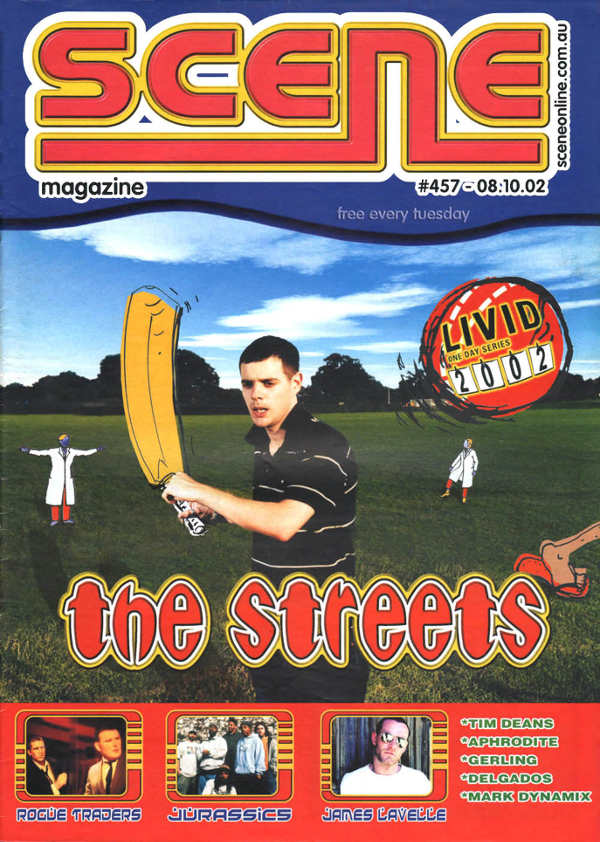
October 2002: Brisbane street press gets its first gloss cover.
“In the middle of that growth, three years into it all (1996), I took on the lease of an abandoned butcher on one of Brisbane’s busiest intersections (Ann and Brunswick Streets) in the heart of what was soon to be the designated Entertainment Precinct – where Universal Store stands today.” And with no catering experience at all – in fact this man burns toast – he opened a 24-hour cafe where the doors never closed. His mother made him close on Easter Friday.
“We called it Cafe Scene. The Internet was exploding so it was an internet cafe. There was a mini-stage for record labels to have performances. There were these huge windows which faced both streets – we lit them up and offered them as promo to the magazine’s clients as a value-add.
“Plus I'd recently re-discovered my passion for chess and the existence of the Brisbane Chess Club so we had chess too.” Howard was later to become the state association's president and one-time Brisbane Chess Club Champion ‘when all the good players didn't turn up’.
“Smoking still happened in cafes so it was a stinking, bohemian, 24/7 internet cafe-come-ticket outlet. Online ticket sales culture was still almost a decade away.” He laughs remembering the challenge of keeping Big Day Out tickets safe from sticky-handed cafe staff and muses. “… it was a different world back then.”
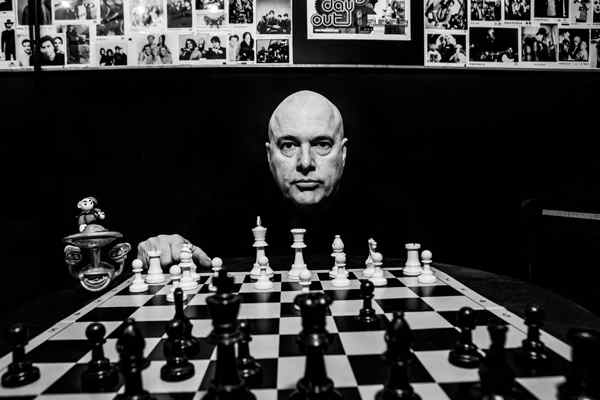
The Long Middle
When running a business, you have to keep going and going, riding out the waves of highs and lows and Scene Magazine was no different. But not all businesses make it. Duggan chiming in with this memory, “In 2002 there were 13 street press titles around Australia, plus more regional ones – and having worked within the Murdoch empire I knew industry rationalisation was inevitable. I remember in 2002 feeling certain that ten years hence, there would only be, say, two players in the music press market and I intended to be one of them.“That was the catalyst for the launch in Melbourne. I thought there would be acquisitions. And I wasn’t in the mood to buy or sell, so I needed to start my own chain. I launched Scene Magazine in Victoria in March 2003: very much a case of walking into the lion’s den.
“To have some sun-touched Queenslander rocking up deciding he wanted to be a part of a market that was apparently already saturated certainly added another dimension to what I understand was an already established street press war.”
Howard published for exactly 12 months out offices at 188 Johnston Street, Collingwood. At considerable cost he'd coaxed five men, including original editor Neil Richards, to relocate from Brisbane or make the weekly commute and he hired Melbourne staff to complete the team.

March 2003: Scene Magazine launches in Melbourne.
“The idea was to take our market-leading electronic music format mag and sit alongside the incumbents which were, like their Queensland counterparts, predominantly rock out front with electronic music sections. It was also the first time any company in our space published separate titles in separate territories under a united brand.
“Clubs, festivals, music retailers and promoters all bought in, as did record labels and national advertisers.
“As with everything, I always bite off more than I can chew. At times like that you chew faster.
"And we certainly caused a stir. Eventually. Of course both competitors knew were we in town but didn’t outwardly react for the first six months. But then things changed rapidly. In a nod to our marching market share one completely rebranded its established dance section – new look, new name – and bought more than a few inner-suburb billboards to publicise the fact. Some reaction! And the other company found publishing religion and joined the 21st century by adding gloss covers (to match Scene Magazine). All this was no conincidence. It was on.”
But three short months later, nine months after launch and just three days before Christmas Howard's first son, Andrew, was born with profound cerebral palsy. “A weekly 4,000 kilometre round trip commute was a challenge given what was happening at home. By January numbers were still tight and we weren't where we needed to be. And our antics had also triggered a price war. To continue that battle (in Melbourne) would have required more resources, personal and financial, than I could muster at that time.
“So in March 2004, exactly 12 months to the week since launch, the decision was made to 'press pause'.” It’d be six years before he published in Melbourne again with Junior and identities such as Ian Molly Meldrum among many notable columnists.
Junior was a relatively short-lived national magazine experiment that Howard suggests may have been ahead of its time. It, too, went out large (audited at over 80,000 copies per issue from a starting mark of a staggering 140,000 copies). Now, almost a decade later there is more than one successful example of a single national magazine format distributed in all territories, including another just released this week which Howard is also involved with.
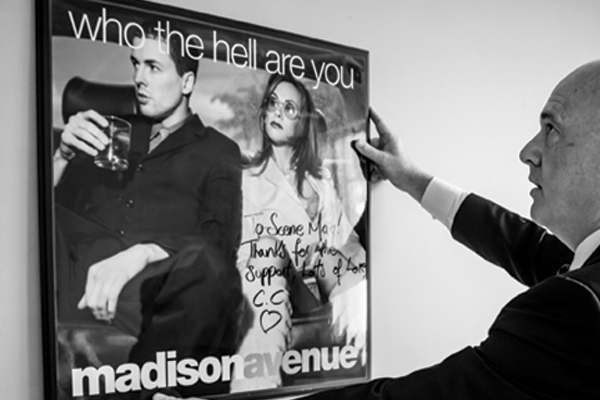
Indeed.
Juggling family duties with an ever-growing desire to expand and explore business opportunities has been constant challenge but it never stops the perennial innovator. Whether it was the launch in Melbourne, the launch of the cafe or the introduction of the coloured paper - the entrepreneurial side of publishing was always there.
"In 2008 we stopped the presses midway through the ‘Batman: The Dark Knight’ edition to switch the front cover from Batman to The Joker. So both covers were on the street at the same time. A collector's edition. We also usd a fluro colour for our masthead. Another street press first, I think."
Howard confesses, “I was always the entrepreneur, not the frustrated writer or musician.” And even that background seemed to be at odds with an industry which seemed to him, especially in days past, obsessed with ‘who was most passionate about music’ and who ‘had a right to be in the industry’.
“Barely two years after our exit from Melbourne the industry witnessed the advent of new player with a large sack of cash which his father had made in foreign language newspapers. He partnered with one of the two publishers in Melbourne and together they embarked on a multi-million dollar spending spree acquiring myriad titles in a quest to buy an empire.
“That conglomerate was met head on by a quickly-put-together group led by the second title in Melbourne, which operated two newspapers including a differently-named one in NSW, teaming with dB (Adelaide), Rave (Brisbane) and Xpress (Perth). All told, two groups of five titles each.”
Howard points that “everyone had a team, except for me. I’d quip those odds (of 10 versus 1) seemed about right!” But in reality it was a challenging time for everyone. “It was rugged for all of us, for a variety of reasons but one of the main ones was the advance of the technological revolution.” The Internet was coming and the publishing industry wasn’t ready. Some less so than others.
In the ensuing decade, half of those readily acquired titles disappeared completely, gracefully closing their doors, ceding either to the digital age or viability due to the absence of scale.
"One of the more fun nuggets to the frenzied buying and selling was orchestrated by a fellow named Morris who had published the iconic electronic music publication 3DWorld in Sydney. He sold it to (yet a different) conglomerate which went bust fairly quickly, bought it back again for a fraction of his original price and then sold it a second time in amost as many years to the first Melbourne group before it was permanently retired shortly thereafter. Jonathan did really well out of that!"
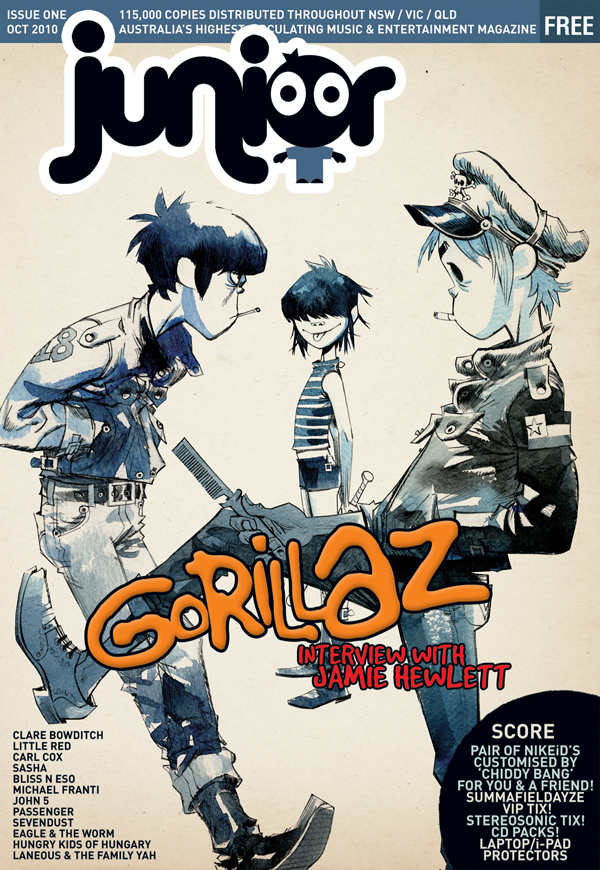
October 2010: 'Junior' was distributed nationally and audited at over 80,000 per edition.
The People
After a rambunctious ride through the publishing industry, Duggan is still standing. And he’s done it without the aid of partners buying in or family to share the load, common to many, if not all, independent publishing houses.He pivoted at crucial moments and made his moves like a seasoned chess player – apparently “an average club player” with an ACF rating around 1650 when he stopped playing competitive chess in 2010. It wasn’t easy and it often wasn’t glamorous or cool. It was hard work, with long hours, and as the leader, all the responsibility came down to rest on him.
But as he says, he would be nowhere without the team that has come along for the journey. From the beginning when the operation was reminiscent of a Rolling Stone Magazine office to the present day sober space with wooden floorboards and soft music in the background, a magazine is only as strong as its people.
Along the way, there have been all sorts of folk through the doors: grimey, rock aficionados who pondered over the set list at gigs, pale and dramatic goths who played video games until all hours of the morning, bubbly chatterboxes in sales and ambitious advertising staff who were using the magazine as a stepping stone to bigger goals. There were egotistical loose cannons who wrecked havoc in their wake and shy, timid music geeks who would sneak in to pick up review albums without saying a word. Scene attracted all the music magazine stereotypes and a handful of oddballs as well.
The one constant was the welcoming attitude Howard had with each new addition to the team, and a straightforward honesty so staff always knew where they stood. “Anything I have spoken about would not have been even remotely possible without the people that have been there with me.
"In the last six years especially, we would be non-existent without Gareth (Bryant – national music editor) who arrived on the bottom editorial rung 17 years ago fresh from uni. Look up ‘stalwart’ on wiki and you’ll find a picture of him.
“We’ve also been lucky to have Neil Richards, our first editor, who had a passion for music but from the get-go he understood the commercial side of the business. Neil's an entrepreneur at heart and he left after three years to pursue his own music business. And so we needed a new editor.
“I had recently opened Cafe Scene where Pat Whyte was knocking over a few casual hours. He was a writer with a degree in journalism who loved his music. He accepted the gig as editor and stayed for a decade. He brought absolute professionalism to the writing side of things. Pat left us to take a senior editorial role at The Courier Mail. Gareth grew into the role and now owns it completely, editing five titles every four weeks as well as overseeing the music side of our digital assets.”

scenestr is published in all five major territories in Australia.
The Now
Buying titles in heady times is one thing. Launching them cold in the apparent winter of an industry’s lifecycle is an entirely separate matter, requiring a different outlook and skillset.Since 2014 Howard has launched titles in South Australia and Western Australia after previous publishers had turned out the lights, as well as in New South Wales and Victoria.
He’s quick to note this is no poor reflection on those publishing pioneers before him recalling his note-to-self of 2002 on industry rationalisation affirming he too would likely be unable to be viable solely in one state without the benefit of scale in 2018.
Looking back over the last 25 years, Howard has consistently demonstrated his ability to evolve and adapt, shifting gears and doing whatever necessary.
The beauty of hindsight is that you can see where you took a wrong turn, or missed an opportunity and there are a handful of times Duggan admits to a feeling of regret.
“I regret not staying in Melbourne in 2004. I'd come in large and we hadn’t yet broken even albeit growing the brand and the revenue. In hindsight I could have probably gone in smaller and stuck around. I don’t think I looked hard enough.
“I regret not being a networker for 20 years. Didn’t enjoy it and was happy for others to take the mantle. But when the industry universally down-sized, everything reverted to basics and I found I quite enjoyed it!
“I was interested in three areas on leaving school: retail, media and law. I’ve turned my hand to the first two but I never studied law. I think I could’ve nailed barrister!
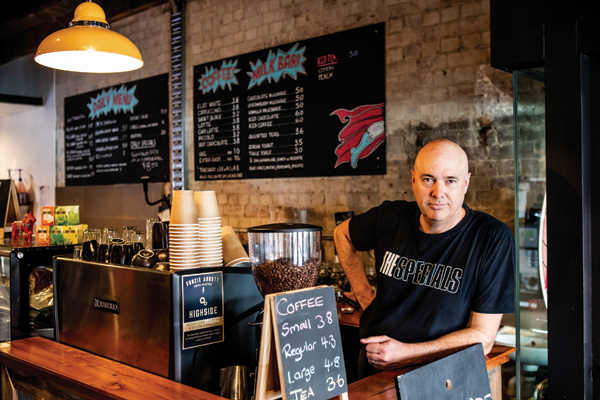
The Future
“On reaching the milestone of 1,000 editions in 2013 I was asked in an interview about the future of the (print publishing) industry. Part of my answer was that following 100 years of relative print industry stability ‘we (I) were making it up as we’re going along’. That’s still true, such are the shifting sands of technology. For example, most people have a working concept of the way the digital age has affected the traditional media model but fewer are aware of the impact social media has had on the revenue of their favourite digital publishers. That's the real surprise packet of the last five years. ”A separate edition of scenestr is now published in every major state in Australia, matched with an online presence on every social media platform, with a team of national writers, reviewers and photographers on hand to capture all the music (and arts, fashion, cultural) moments as they happen. The company also runs video crews in most states.
The office is in the same location since 1998 move from Teneriffe. Duggan still has the same amount of hair but more wrinkles, his family still remains his first priority and he never hesitates to go in for the obvious punchline.
And things aren’t slowing down. Six months ago he and wife, Renée, took on the space vacated by Foundry Records in Wickham Street, Fortitude Valley and rebranded it as Daily Planet Café: that moniker derived after reference jumps from scenestr to pop culture to Superman to Clark Kent to that superhero’s newspaper of the same name.
And just this week the company has rolled out the printing and distribution logistics on behalf of new music title Heavy Magazine’s 64-page inaugural edition around Australia.
While life often seems ponderous and slow as you’re living it, when you look back over your time, it snaps back into what feels like a microsecond. But no matter how quickly the time passed, nothing can diminish the fact that for 25 years, Duggan has helmed his publishing ship through impossibly bumpy waters with tenacity and unexpected grace to become one of the last men standing in independent publishing in Australia.






